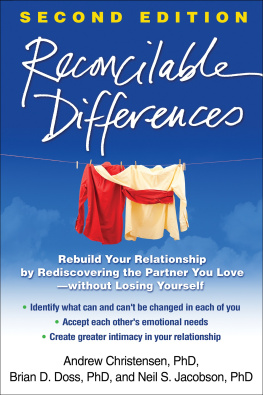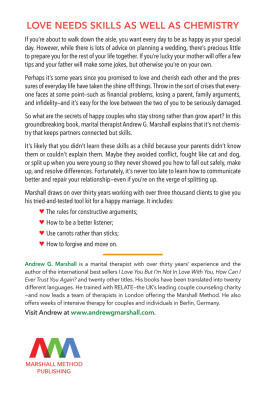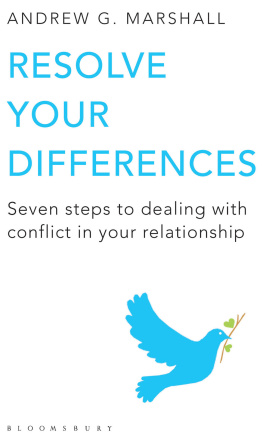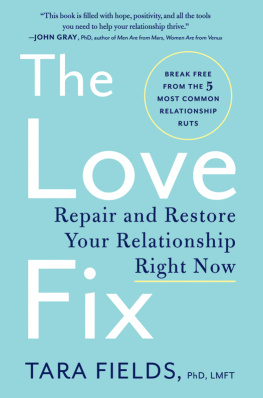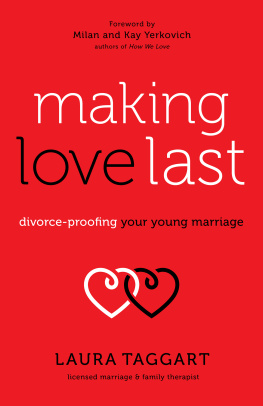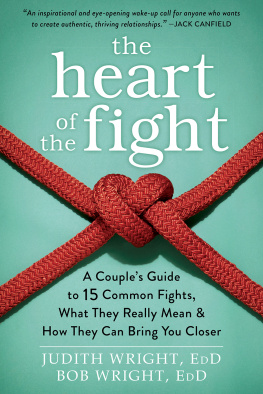Praise for
Reconcilable Differences
One virtue of the book is its utter realism.... Offers a slew of tools that couples can use to reconcile their differences without the help of a therapist.
JANE BRODY, The New York Times
When partners fight, they often push each other to change. But seeing conflicts from the others perspective helps move the couple away from anger and blame. This invaluable book provides concrete strategies to do just that. With a deeper understanding of your partners emotional vulnerabilities, you can build trust and intimacy, and maybe even bring about the changes that matter most to you.
JANIS ABRAHMS SPRING, P H D, author of After the Affair
No matter how many books you have read to improve your relationship, read this one, and follow the research-based principles it presents! The authors are internationally known scientists who have produced a book that all couples need to read. Its not the differences between you and your partner that matter, but how you handle them, and this book shows exactly how and why.
HOWARD J. MARKMAN, P H D, coauthor of Fighting for Your Marriage
This deceptively simple book can change lives. You and your partner will learn numerous ways to accept each other and achieve a new level of happiness and comfort in your relationship. The genius of the book is that these techniques are not difficult, and they can help put an end to perpetual conflict.
PEPPER SCHWARTZ, P H D, coauthor of The Normal Bar: The Surprising Secrets of
Happy Couples and What They Reveal about Creating a New Normal in Your Relationship
It is often so difficult for quarreling couples to find a way through the thicket of blame, accusation, and resentment that ensnares them, but this splendid book illuminates some pathways out. The first edition was terrific, but this revision goes beyond it, bringing in new research, fresh ideas, and, as usual, practical solutions. All couples who find themselves enduring repeated conflictswhich is to say, nearly all coupleswill benefit from this fine book.
CAROL TAVRIS, P H D, coauthor of Mistakes Were Made (but Not by Me)
There are lots of books for couples that make interesting reading, and some that provide specific, doable suggestions for improving your relationship, but just a handfulincluding this onebased on principles that have been scientifically shown to work. Any couple that wants to better understand and overcome problems in their relationship will find this book a great place to start.
W. KIM HALFORD, P H D, School of Psychology, University of Queensland, Australia
Gives several guides to building acceptance.
USA Today
Packed with data, wisdom, and common sense.
POLLY DREW, Milwaukee Journal Sentinel
Reconcilable
Differences
SECOND EDITION
Rebuild Your Relationship by Rediscovering
the Partner You Lovewithout Losing Yourself
ANDREW CHRISTENSEN, P H D
BRIAN D. DOSS, P H D
NEIL S. JACOBSON, P H D
 The Guilford Press
The Guilford Press New York London
Epub Edition ISBN: 9781462513239; Kindle Edition ISBN: 9781462513246
2014 The Guilford Press
A Division of Guilford Publications, Inc.
72 Spring Street, New York, NY 10012
www.guilford.com
All rights reserved
The information in this volume is not intended as a substitute for consultation with healthcare professionals. Each individuals health concerns should be evaluated by a qualified professional.
No part of this book may be reproduced, translated, stored in a retrieval system, or transmitted, in any form or by any means, electronic, mechanical, photocopying, microfilming, recording, or otherwise, without written permission from the publisher.
Last digit is print number: 9 8 7 6 5 4 3 2 1
Library of Congress Cataloging-in-Publication Data
Christensen, Andrew, 1946
Reconcilable differences : rebuild your relationship by rediscovering
the partner you lovewithout losing yourself / Andrew Christensen,
Brian D. Doss, and Neil S. Jacobson. Second edition
pages cm
Includes bibliographical references and index.
ISBN 978-1-4625-0243-1 (pbk.) ISBN 978-1-4625-1231-7 (hardcover)
1. Couples. 2. Manwoman relationships. 3. Interpersonal
communication. 4. Interpersonal relations. 5. Conflict management.
I. Doss, Brian David, 1975 II. Jacobson, Neil S., 19491999 III. Title.
HQ801.C4867 2014
306.7dc23
2013037587
During the production phase for the first edition of this book, Neil S. Jacobson died suddenly and unexpectedly. His death is an incalculable loss to his family and friends and to the three fields in which he was a leading scholar and researcher: marital therapy, domestic violence, and depression.
As his close collaborator and friend for years, I miss him greatly. This book is dedicated to his honor and memory.
A. C.
Contents
There are those who influenced my ideas, those who helped me articulate them in this book, those who helped me implement these ideas with couples, and those who helped me live the reality of these ideas. All deserve acknowledgment.
Clearly my coauthors, Neil S. Jacobson and Brian D. Doss, have had the foremost influence on my ideas about couple therapy. Through years of productive discussion, joint writing projects, and joint supervision of our clinicians, the late Neil Jacobson and I developed and refined our approach to couple therapy. We each might have been able to develop this approach alone, but not nearly as well and not nearly as enjoyably. My former graduate student and now colleague and coauthor Brian Doss brought a keen interest in dissemination to our work and creativity in adapting integrative behavioral couple therapy (IBCT) to a larger audience. From his early research on what leads people to seek couple therapy to his current, monumental effort to translate IBCT into an online program accessible to all, he has demonstrated not only an ability to think big but also the energy and tenacity to follow through. Aside from Neil and Brian, other important influences on my thinking were Robert Weiss, a father of behavioral couple therapy and my first marital therapy supervisor; Gayla Margolin, with whom I conducted my first clinical study of marital therapy; the late Harold Kelley, an influential social psychologist with whom I worked early in my career; and Dan Wile, whose clinical writings, though coming from a dramatically different theoretical perspective, directly influenced my own work with couples. And, finally, the couples with whom I worked, either directly in my private practice or indirectly by watching hours of their therapy sessions on videotape, were a continued challenge to my thinking and a repeated reminder that the dirty and tender reality of conflict and love is always more complicated than our theories envision.
Next page
